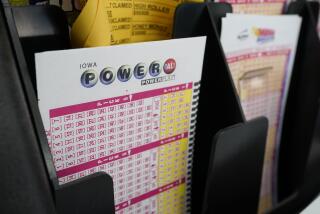States Fail to Find Any Bonanza From Lotteries
- Share via
WASHINGTON — Back in the 1960s and 1970s, when the idea of governmental bodies running lotteries began to catch on, they were widely touted as a painless way to ease the revenue problems of financially hard-pressed states. Moreover, proponents argued, lottery money could be earmarked for such critical needs as education.
But as things have turned out, while state lotteries have blossomed from coast to coast, they are making only a minuscule contribution to state budgets. And as far as winning is concerned, government-run lotteries pay out in prizes far less of what they take in than do privately owned, run-for-profit gambling casinos. They give far poorer odds, too.
Today, fully 31 states, including California, and the District of Columbia have some form of lottery. And many do earmark income for education and other social purposes.
In reality, however, that has not meant much money for the programs. The dollar amounts contributed to state treasuries may sound large, but they are only a tiny fraction of the whole. California is typical:
Fully 34% of the Golden State’s lottery proceeds are set aside for education, and officials say a campaign to increase ticket sales has as its goal stabilizing the funds available for schools. Yet the state lottery commission itself, fearing a public backlash if expectations rose too high, recently ran a series of commercials pointing out that--on average--the lottery contributes only 3% of state education funds.
New York’s lottery revenues, although earmarked solely for education, do not increase state spending for schools. Instead, legislators estimate likely lottery revenues and reduce funding from other sources accordingly.
And Minnesota, while plugging lottery ticket sales as a way to help preserve its lakes and wildlife, allocates only a fraction of the proceeds to environmental needs.
As for lottery players’ chances of winning, the odds are more favorable by far on the slot machines and gambling tables of any legal casino.
John McGervey, an expert on probabilities at Case Western University, points out that the odds of winning in one turn of a roulette wheel are 1 in 38. The odds of pyramiding a $1 bet into $1 million are about 1 chance in 2 million.
Those are long odds. But your chances of winning the top prize in Florida’s lottery are 1 in 13,983,816. In California’s Lotto, they are a staggering 1 in 22,957,480. Even winning a prize of $5 is not easy. In Florida’s Lotto game it’s a 1 in 54 chance. In California, it’s 1 in 71.
Few state lotteries note those dismal odds in their commercials. State lottery commissions insist the public does not seriously expect to win. “I think most people do understand that (winning) is a dream,” New York Lottery spokesman Bill Knowlton observed.
Charles Clotfelter, a professor of economics at Duke University and co-author of a book about lotteries in the United States, said studies he has carried out indicate that most people care less about the statistical odds of winning than about the size of the jackpot.


